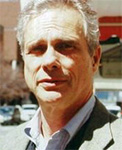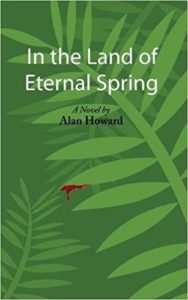Review — IN THE LAND OF ETERNAL SPRING by Alan Howard
In the Land of Eternal Spring
by Alan Howard
Harvard Square Editions
June 2017
305 pages
$22.95 (paperback)
Reviewed by Mark Brazaitis (Guatemala, 1991-93)
•
If Ernest Hemingway had written a novel about the Guatemalan civil war — or la violencia, as it’s sometimes called — it might well have looked like In the Land of Eternal Spring.

Alan Howard
Alan Howard’s debut novel features an idealistic hero with a fondness for the ladies, Peter Franklin, and an alluring, brave, but dangerously naïve heroine, Laura Jenson.
If you close your eyes slightly as you’re reading Howard’s book, you might think you’ve been transported to the Spain of the 1930s and into Hemingway’s For Whom the Bell Tolls. Robert Jordan, meet Peter Franklin — you’re soul brothers.
Howard’s prose, sometimes effectively functional, often quietly poetic, is reminiscent of Hemingway’s. So, too, is his melancholic tone.
This is all a compliment. Howard’s novel is compelling from start to finish, and it’s a pleasure to read.
The novel opens in 1963, when the Peace Corps started its Guatemala program. Laura is a Volunteer. Peter is hired to oversee the writing and publication of a training guide for teachers.
Problem: the U.S. government, fresh off the disruption of the Cuban revolution and worried about unrest in Vietnam and elsewhere, isn’t eager to see the Guatemalan masses become literate and thereby empowered. Therefore, its officials, including the nefarious Thornby, in collusion with the Guatemalan ruling class and military, do all they can to hinder Peter’s efforts. Laura has even greater ambitions than Peter. She wants outright revolution. She is willing to risk her life, and whatever future she might have with Peter, to achieve it. We know, and fear, the forces against her.
Will Peter be willing to fight alongside Laura? Or might he be diverted by another love interest, the mercurial but alluring Argelia? Or might he assess the long odds of success and head back to the States?
From its Hemingway-like opening paragraph, the novel alludes to a tragic outcome:
If anyone had asked, I would have honestly replied I hardly ever think of her anymore, but sitting in front of the fire the other night in this little house above the sea, I noticed the orange flare of the pine sprigs that sometimes get mixed into the kindling, and as happens whenever I am in a certain mood and see this incandescent flow in the black fireplace, I see those mysterious orange lights on the mountainside that night in Santa Cruz del Quiché, the lights Laura said made her feel closer to God, and I am reminded with a gentle shock that I have felt her there inside me every day of my life for the past 50 years.
Compare this with the opening of For Whom the Bell Tolls:
He lay flat on the brown, pine-needled floor of the forest, his chin on his folded arms, and high overhead the wind blew in the tops of the pine trees. The mountainside sloped gently where he lay; but below it was steep and he could see the dark of the oiled road winding through pass. There was a stream alongside the road and far down he saw a mill beside the stream and the falling water of the dam, white in the summer sunlight.
We have in Howard’s and Hemingway’s openings: Pine . . . mountains . . . and the contrast of light (“lights Laura said made her feel closer to God,” “white in the summer sunlight”) and dark (“the black fireplace,” “the dark of the oiled road”).
To write about the Guatemala civil war (or the Spanish Civil War) is, inevitably, to write a sad story. But as with Francisco Goldman’s wonderful novel The Long Night of White Chickens, whose Guatemalan heroine is the beautiful but doomed embodiment of her country, In the Land of Eternal Spring isn’t without humor — or page-turning suspense. Even if we are sure that its lovers are star-crossed, we can’t help but follow them to the finish, hoping against hope that their stars will, in improbable happily-ever-after fashion, align.
In addition to being an excellent novel, In the Land of Eternal Spring is a powerful history lesson. It shows us, dramatically, what Guatemala was like at the start of its 36-year-long conflict. And it isn’t shy about filling us in on the war’s subsequent devastation. An italicized portion near the novel’s end depicts, in grim detail, a massacre in Santa Cruz del Quiché in which 107 children, 70 women, and 26 men are killed. (The war claimed more than 200,000 Guatemalan lives.) Peter Franklin, who subsequent to his experiences in Guatemala becomes an international correspondent, sums up the toll on his psyche:
I have traveled much of the world in the course of my working life and seen my share of the cruelty that human beings inflict on one another. Like most other educated people I am aware there is no shortage of barbarism any place on earth inhabited by our species, but I have never returned to Guatemala.
Peter does return to Guatemala — in memory if not in body — and we are enriched, if also saddened, as we accompany him on his journey.
Alan Howard has written for The New York Times Magazine, the Nation, Dissent, public television and labor union publications about workers and politics in the US and many other countries around the world. He was a Fulbright Scholar at San Carlos University in Guatemala, an International Fellow at Columbia University, the Latin American correspondent for Liberation News Service, and a national volunteer leader in the 2008 and 2012 campaigns of Barack Obama. His novella Hollywood Furs was short-listed for the 2011 Paris Literary Prize.
In the Land of Eternal Spring is his first novel. While he was in Guatemala from 1963 to 1965 on a Fulbright to study the U.S.-supported national literacy campaign, he worked on in-country training with the Peace Corps and developed material for the PCV literacy work.
•
Reviewer Mark Brazaitis is the author of seven books, including The River of Lost Voices: Stories from Guatemala, winner of the 1998 Iowa Short Fiction Award, The Incurables: Stories, winner of the 2012 Richard Sullivan Prize and the 2013 Devil’s Kitchen Reading Award in Prose, and Julia & Rodrigo, winner of the 2012 Gival Press Novel Award. His latest book, Truth Poker: Stories, won the 2014 Autumn House Press Fiction Competition.

Thank you, for this incisive review, Mark. It has propelled me to buy the book. As one who loves Guatemala and its people, I still grieve the aftermath of the violence of the period about which Goldman, you, and now, Howard, has written.
With warm regards,
Patricia Edmisten (Peru, 1962-64)
Excellent review Mark–and I too have purchased the book and look forward to reading it. This is an important and tragic period of Guatemala’s history and our government was involved in many ways. I’ve just published my own book, “Different Latitudes: My Life in the Peace Corps and Beyond”, much of which takes place in Guatemala and some of that in Quiche and includes a chapter on the civil war and other tragic aspects of Guatemala’s history. I preferred the “creative non-fiction” approach but look forward to reading what seems to be a well written novel.
Cheers,
Mark D. Walker (Guatemala, 1971-1973)